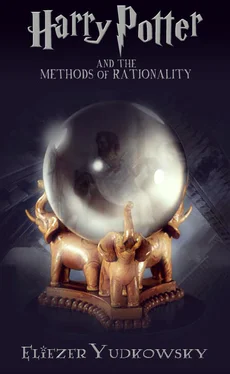Draco would wield the Conspiracy and the power of science to purify the wizarding world, and Father would be as proud of him as if he'd been a Death Eater.
Harry Potter's evil plots would be foiled, and the forces of right would prevail.
The perfect revenge.
Unless...
Just pretend to be pretending to be a scientist, Harry had told him.
Draco didn't have words to describe exactly what was wrong with Harry's mind -
(since Draco had never heard the term depth of recursion )
- but he could guess what sort of plots it implied.
...unless all that was exactly what Harry wanted Draco to do as part of some even larger plot which Draco would play right into by trying to foil this one, Harry might even know that his plan was unworkable, it might have no purpose except luring Draco to thwart it -
No. That way lay madness. There had to be a limit. The Dark Lord himself hadn't been that twisty. That sort of thing didn't happen in real life, only in Father's silly bedtime stories about foolish gargoyles who always ended up furthering the hero's plans every time they tried to stop him.
And beside Draco, Harry walked along with a smile on his face, thinking about the evolutionary origins of human intelligence.
In the beginning, before people had quite understood how evolution worked, they'd gone around thinking crazy ideas like human intelligence evolved so that we could invent better tools.
The reason why this was crazy was that only one person in the tribe had to invent a tool, and then everyone else would use it, and it would spread to other tribes, and still be used by their descendants a hundred years later. That was great from the perspective of scientific progress, but in evolutionary terms, it meant that the person who invented something didn't have much of a fitness advantage , didn't have all that many more children than everyone else. Only relative fitness advantages could increase the relative frequency of a gene in the population, and drive some lonely mutation to the point where it was universal and everyone had it. And brilliant inventions just weren't common enough to provide the sort of consistent selection pressure it took to promote a mutation. It was a natural guess, if you looked at humans with their guns and tanks and nuclear weapons and compared them to chimpanzees, that the intelligence was there to make the technology. A natural guess, but wrong.
Before people had quite understood how evolution worked, they'd gone around thinking crazy ideas like the climate changed, and tribes had to migrate, and people had to become smarter in order to solve all the novel problems.
But human beings had four times the brain size of a chimpanzee. 20% of a human's metabolic energy went into feeding the brain. Humans were ridiculously smarter than any other species. That sort of thing didn't happen because the environment stepped up the difficulty of its problems a little. Then the organisms would just get a little smarter to solve them. Ending up with that gigantic outsized brain must have taken some sort of runaway evolutionary process, something that would push and push without limits.
And today's scientists had a pretty good guess at what that runaway evolutionary process had been.
Harry had once read a famous book called Chimpanzee Politics. The book had described how an adult chimpanzee named Luit had confronted the aging alpha, Yeroen, with the help of a young, recently matured chimpanzee named Nikkie. Nikkie had not intervened directly in the fights between Luit and Yeroen, but had prevented Yeroen's other supporters in the tribe from coming to his aid, distracting them whenever a confrontation developed between Luit and Yeroen. And in time Luit had won, and become the new alpha, with Nikkie as the second most powerful...
...though it hadn't taken very long after that for Nikkie to form an alliance with the defeated Yeroen, overthrow Luit, and become the new new alpha.
It really made you appreciate what millions of years of hominids trying to outwit each other - an evolutionary arms race without limit - had led to in the way of increased mental capacity.
'Cause, y'know, a human would have totally seen that one coming.
And beside Harry, Draco walked along, suppressing his smile as he thought about his revenge.
Someday, maybe in years but someday, Harry Potter would learn just what it meant to underestimate a Malfoy.
Draco had awakened as a scientist in a single day. Harry had said that wasn't supposed to happen for months.
But of course if you were a Malfoy, you would be a more powerful scientist than anyone who wasn't.
So Draco would learn all of Harry Potter's methods of rationality, and then when the time was ripe -
Chapter 25: Hold Off on Proposing Solutions
Act 2:
(The sun shone brilliantly into the Great Hall from the enchanted sky-ceiling above, illuminating the students as though they sat beneath the naked sky, gleaming from their plates and bowls, as, refreshed by a night's sleep, they inhaled breakfast in preparation for whatever plans they'd made for their Sunday.)
So. There was only one thing that made you a wizard.
That wasn't surprising, when you thought about it. What DNA mostly did was tell ribosomes how to chain amino acids together into proteins. Conventional physics seemed quite capable of describing amino acids, and no matter how many amino acids you chained together, conventional physics said you would never, ever get magic out of it.
And yet magic seemed to be hereditary, following DNA.
Then that probably wasn't because the DNA was chaining together nonmagical amino acids into magical proteins.
Rather the key DNA sequence did not, of itself, give you your magic at all.
Magic came from somewhere else.
(At the Ravenclaw table there was one boy who was staring off into space, as his right hand automatically spooned some unimportant food into his mouth from whatever was in front of him. You probably could have substituted a pile of dirt and he wouldn't have noticed.)
And for some reason the Source of Magic was paying attention to a particular DNA marker among individuals who were ordinary ape-descended humans in every other way.
(Actually there were quite a lot of boys and girls staring off into space. It was the Ravenclaw table, after all.)
There were other lines of logic leading to the same conclusion. Complex machinery was always universal within a sexually reproducing species. If gene B relied on gene A, then A had to be useful on its own, and rise to near-universality in the gene pool on its own, before B would be useful often enough to confer a fitness advantage. Then once B was universal you would get a variant A* that relied on B, and then C that relied on A* and B, then B* that relied on C, until the whole machine would fall apart if you removed a single piece. But it all had to happen incrementally - evolution never looked ahead, evolution would never start promoting B in preparation for A becoming universal later. Evolution was the simple historical fact that, whichever organisms did in fact have the most children, their genes would in fact be more frequent in the next generation. So each piece of a complex machine had to become nearly universal before other pieces in the machine would evolve to depend on its presence.
So complex, interdependent machinery, the powerful sophisticated protein machines that drove life, was always universal within a sexually reproducing species - except for a small handful of non -interdependent variants that were being selected on at any given time, as further complexity was slowly laid down. It was why all human beings had the same underlying brain design, the same emotions, the same facial expressions wired up to those emotions; those adaptations were complex, so they had to be universal.
Читать дальше











